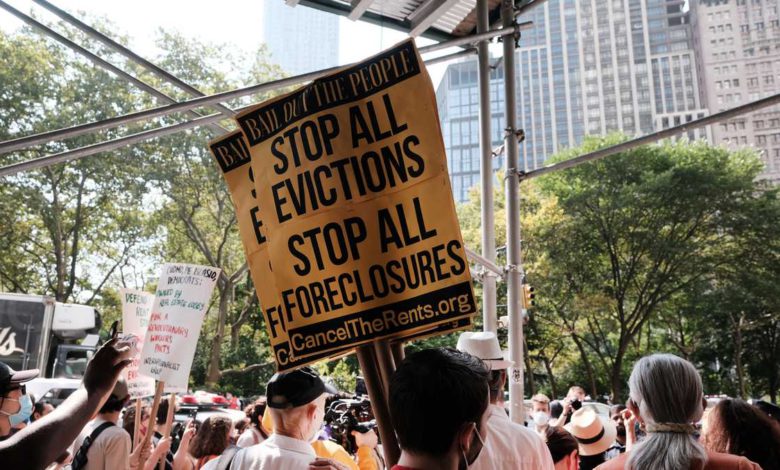

Video above: Tenants worry as US eviction moratorium expiresThe federal eviction ban, which protected millions of struggling renters while frustrating landlords across the country, has ended for the second time in just four weeks.On Thursday, the Supreme Court blocked the latest eviction moratorium, writing in an unsigned, eight-page opinion: "Congress was on notice that a further extension would almost surely require new legislation, yet it failed to act in the several weeks leading up to the moratorium's expiration."The back and forth over what landlords can do in terms of evictions and what renters can expect when they have lost income due to the pandemic has been legally, financially and emotionally fraught for both groups. The end of the federal protection has landlords declaring victory and housing advocates calling it a "tragic" and "avoidable" outcome.The eviction moratorium was put in place last September by the Centers for Disease Control and Prevention to prevent the spread of coronavirus. When it expired at the end of July, there was a strong and vocal reaction from housing advocates and members of Congress that ending the ban before the bulk of the federal government's $46 billion in emergency rental assistance was distributed would undermine the point of the moratorium in the first place.Days later, on August 3, the CDC issued a new eviction ban covering areas where COVID-19 infection rates are elevated, protecting about 90% of renters. The new moratorium was challenged in court by landlords and real estate companies, leading to the Supreme Court's ruling on Thursday.In a U.S. Census Bureau survey conducted at the beginning of August, more than 3 million renters said they will likely have to leave their home due to eviction in the next two months."The federal eviction moratorium was a lifeline for millions of families, the last remaining federal protection keeping them safely and stably housed throughout the pandemic," said Diane Yentel, president and CEO of the National Low Income Housing Coalition. "The tragic, consequential, and entirely avoidable outcome of this ruling will be millions of people losing their homes this fall and winter, just as the delta variant ravages communities and lives."Renters will need to turn to local protectionsEviction filings are expected to ramp up, but it is yet to be seen how backlogged courts are and how effective the remaining patchwork of state and local protections will be in keeping renters in place until they secure rent relief."There will be a ton of eviction filings," said John Pollock, coordinator for the National Coalition for a Civil Right to Counsel, which advocates for renters. "How quickly the courts might actually evict everyone, is hard to say. Courts have shown they can be ruthlessly efficient, they can dispose of hundreds of cases in a morning."Many struggling renters were hoping to receive emergency rental assistance from the government to pay their back rent and remain in their home. The latest eviction moratorium had provided a critical backstop to ensure they stayed in place until that money was received.But of the $46 billion in emergency rent relief money, only $5.1 billion had been distributed through July, according to the Treasury Department. That means about 89% of the money set aside for renters had yet to be distributed.Because of that, Pollock expects that some courts will try to take it slow."If they are paying attention at all they know most of that hasn't gotten to anyone yet," Pollock said. "Many judges will push back and give tenants a chance. Take a moment to at least ask them, 'Have you applied?' And judges may be telling landlords, 'Before you file to evict, you need to apply for rent relief first.'"State and local jurisdictions have been introducing legislation and putting in place their own eviction bans to protect renters while the process of distributing rental assistance continues.States like California and Illinois have extended their state eviction moratoriums. Other states, like Minnesota, Nevada and New York, have put in place laws that protect renters from eviction while they are in the process of applying for emergency rental assistance.Some communities are creating eviction diversion programs, which encourage mediation between the landlord and tenant before evictions can proceed.Pollock said struggling renters facing eviction should contact their local legal aid organization, which should be aware of any additional local protections. They should also apply for rent relief. There is a searchable list of rental assistance programs at the U.S. Treasury and another one managed by the National Low Income Housing Coalition.Landlords relieved the moratorium is over Landlords and property owners, many of whom continue to work with renters to help them get rent relief, have been frustrated they cannot remove tenants who are unwilling to apply for rental assistance."This ruling will allow property owners the benefit of their property and also light a fire under tenants to access ... the Congressionally authorized solution to this problem, which was rent support," said John Vecchione, senior litigation counsel at New Civil Liberties Alliance, an organization aiming to protect constitutional freedoms that has brought several cases against the CDC regarding the eviction moratorium"This illegal order not only injured thousands of mom-and-pop housing providers, but undermined the actual policy Congress chose to address the COVID-19 rental market disruptions," he said.The National Apartment Association, an industry group of landlords, has long held that the CDC's eviction moratorium was unlawful and said it was pleased with the U.S. Supreme Court ruling striking down the order. But, Bob Pinnegar, the president and CEO of NAA, warned there's a lot of outstanding debt that has built up since the moratorium was put in place."Though the moratorium is lifted, it is important to remember that billions in debt remain on renters' records and housing providers' shoulders -- it's past time to focus on the most sustainable path forward of full rental assistance funding and streamlined distribution," said Pinnegar.Calls for more protectionsAdvocates for renters and those concerned about the health issues involved with millions of people facing eviction while the pandemic continues, are calling on Congress, states and local governments to put new eviction protections in place for renters."All levels of government must now take immediate action to protect the most vulnerable renters and ensure everyone has safe and stable housing during the ongoing COVID-19 pandemic and beyond," said Ian Thompson, senior legislative advocate at the American Civil Liberties Union.With millions of people now facing eviction, Thompson also wants states and communities to put in place protections for renters after they've been evicted, including offering them a right to counsel and banning screening policies that reject applicants due to a prior eviction."We need this meaningful action to stop mass evictions with devastating racial and gender disparities during the pandemic and beyond," said Thompson.The Supreme Court decision undermines unprecedented efforts by Congress and the White House to ensure housing stability during the pandemic, said Yentel of the National Low Income Housing Coalition."State and local governments are working to improve programs to distribute emergency rental assistance to those in need, but they need more time. The Supreme Court's decision will lead to many renters, predominantly people of color, losing their homes before the assistance can reach them," she said. "The tragic consequences of this decision will reverberate for years."
Video above: Tenants worry as US eviction moratorium expires
The federal eviction ban, which protected millions of struggling renters while frustrating landlords across the country, has ended for the second time in just four weeks.
On Thursday, the Supreme Court blocked the latest eviction moratorium, writing in an unsigned, eight-page opinion: "Congress was on notice that a further extension would almost surely require new legislation, yet it failed to act in the several weeks leading up to the moratorium's expiration."
The back and forth over what landlords can do in terms of evictions and what renters can expect when they have lost income due to the pandemic has been legally, financially and emotionally fraught for both groups. The end of the federal protection has landlords declaring victory and housing advocates calling it a "tragic" and "avoidable" outcome.
The eviction moratorium was put in place last September by the Centers for Disease Control and Prevention to prevent the spread of coronavirus. When it expired at the end of July, there was a strong and vocal reaction from housing advocates and members of Congress that ending the ban before the bulk of the federal government's $46 billion in emergency rental assistance was distributed would undermine the point of the moratorium in the first place.
Days later, on August 3, the CDC issued a new eviction ban covering areas where COVID-19 infection rates are elevated, protecting about 90% of renters. The new moratorium was challenged in court by landlords and real estate companies, leading to the Supreme Court's ruling on Thursday.
In a U.S. Census Bureau survey conducted at the beginning of August, more than 3 million renters said they will likely have to leave their home due to eviction in the next two months.
"The federal eviction moratorium was a lifeline for millions of families, the last remaining federal protection keeping them safely and stably housed throughout the pandemic," said Diane Yentel, president and CEO of the National Low Income Housing Coalition. "The tragic, consequential, and entirely avoidable outcome of this ruling will be millions of people losing their homes this fall and winter, just as the delta variant ravages communities and lives."
Renters will need to turn to local protections
Eviction filings are expected to ramp up, but it is yet to be seen how backlogged courts are and how effective the remaining patchwork of state and local protections will be in keeping renters in place until they secure rent relief.
"There will be a ton of eviction filings," said John Pollock, coordinator for the National Coalition for a Civil Right to Counsel, which advocates for renters. "How quickly the courts might actually evict everyone, is hard to say. Courts have shown they can be ruthlessly efficient, they can dispose of hundreds of cases in a morning."
Many struggling renters were hoping to receive emergency rental assistance from the government to pay their back rent and remain in their home. The latest eviction moratorium had provided a critical backstop to ensure they stayed in place until that money was received.
But of the $46 billion in emergency rent relief money, only $5.1 billion had been distributed through July, according to the Treasury Department. That means about 89% of the money set aside for renters had yet to be distributed.
Because of that, Pollock expects that some courts will try to take it slow.
"If they are paying attention at all they know most of that [rent relief] hasn't gotten to anyone yet," Pollock said. "Many judges will push back and give tenants a chance. Take a moment to at least ask them, 'Have you applied?' And judges may be telling landlords, 'Before you file to evict, you need to apply for rent relief first.'"
State and local jurisdictions have been introducing legislation and putting in place their own eviction bans to protect renters while the process of distributing rental assistance continues.
States like California and Illinois have extended their state eviction moratoriums. Other states, like Minnesota, Nevada and New York, have put in place laws that protect renters from eviction while they are in the process of applying for emergency rental assistance.
Some communities are creating eviction diversion programs, which encourage mediation between the landlord and tenant before evictions can proceed.
Pollock said struggling renters facing eviction should contact their local legal aid organization, which should be aware of any additional local protections. They should also apply for rent relief. There is a searchable list of rental assistance programs at the U.S. Treasury and another one managed by the National Low Income Housing Coalition.
Landlords relieved the moratorium is over
Landlords and property owners, many of whom continue to work with renters to help them get rent relief, have been frustrated they cannot remove tenants who are unwilling to apply for rental assistance.
"This ruling will allow property owners the benefit of their property and also light a fire under tenants to access ... the Congressionally authorized solution to this problem, which was rent support," said John Vecchione, senior litigation counsel at New Civil Liberties Alliance, an organization aiming to protect constitutional freedoms that has brought several cases against the CDC regarding the eviction moratorium
"This illegal order not only injured thousands of mom-and-pop housing providers, but undermined the actual policy Congress chose to address the COVID-19 rental market disruptions," he said.
The National Apartment Association, an industry group of landlords, has long held that the CDC's eviction moratorium was unlawful and said it was pleased with the U.S. Supreme Court ruling striking down the order. But, Bob Pinnegar, the president and CEO of NAA, warned there's a lot of outstanding debt that has built up since the moratorium was put in place.
"Though the moratorium is lifted, it is important to remember that billions in debt remain on renters' records and housing providers' shoulders -- it's past time to focus on the most sustainable path forward of full rental assistance funding and streamlined distribution," said Pinnegar.
Calls for more protections
Advocates for renters and those concerned about the health issues involved with millions of people facing eviction while the pandemic continues, are calling on Congress, states and local governments to put new eviction protections in place for renters.
"All levels of government must now take immediate action to protect the most vulnerable renters and ensure everyone has safe and stable housing during the ongoing COVID-19 pandemic and beyond," said Ian Thompson, senior legislative advocate at the American Civil Liberties Union.
With millions of people now facing eviction, Thompson also wants states and communities to put in place protections for renters after they've been evicted, including offering them a right to counsel and banning screening policies that reject applicants due to a prior eviction.
"We need this meaningful action to stop mass evictions with devastating racial and gender disparities during the pandemic and beyond," said Thompson.
The Supreme Court decision undermines unprecedented efforts by Congress and the White House to ensure housing stability during the pandemic, said Yentel of the National Low Income Housing Coalition.
"State and local governments are working to improve programs to distribute emergency rental assistance to those in need, but they need more time. The Supreme Court's decision will lead to many renters, predominantly people of color, losing their homes before the assistance can reach them," she said. "The tragic consequences of this decision will reverberate for years."
Source link









